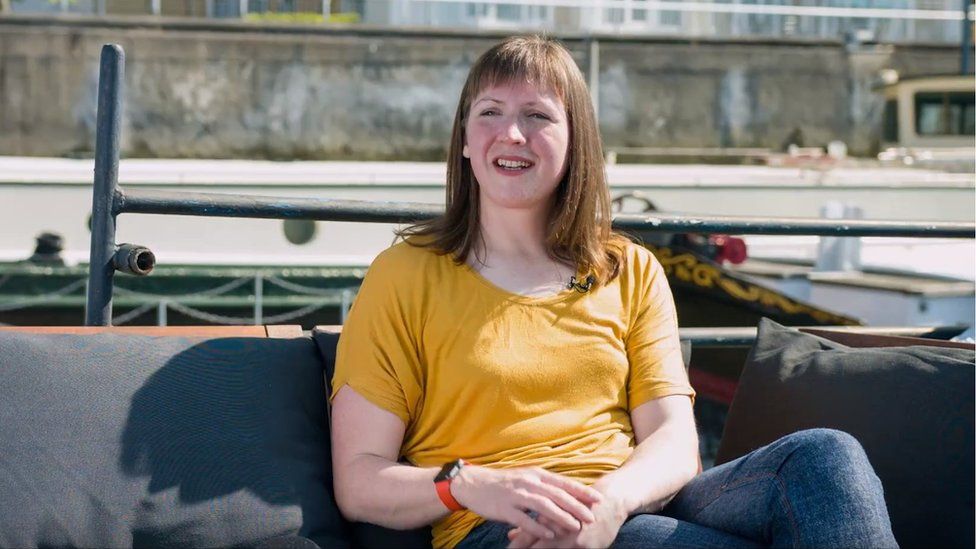From bone marrow transplant to winning medals
- Published

Tens of millions of chronically ill people around the world rely on repeat prescriptions, but getting the drugs they need can be a time-consuming and frustrating process. Now apps, automation and home delivery services are making their lives easier.
When Melissa Fehr came home from hospital after undergoing a major bone marrow procedure, she says she was carrying "two enormous bags of medication".
There were drugs to guard against infection, and other drugs to combat the side effects of other drugs, she says.
A bout of shingles was "horrible ... it was just constant pain, so I was prescribed five or six different pain killers", she says.
"It was at that point I realised I needed an app to manage things, because some of them were five times a day, some were three times a day, some were within an hour of eating, some were 'you can't eat'...it was all over the place."
So she went online and found an app that gave her an alert every time she needed to take one of her medications and recorded each time she took something.
"I've been using it for years," she says.
But an added complication was getting doctors to sign off repeat prescriptions and then going to the pharmacy to fulfil the order. She would often have to do this in person each time, despite having the same prescription each month.
Even surgeries that had electronic prescription capability would sometimes fall down on their communications when the prescribing doctor went on holiday, says Ms Fehr.
This was frustrating and wasted a lot of her time.
Now the revamped Echo app keeps tabs on her medications consumption, automatically re-orders the drugs for her and sends them to her by post.
"It's been an absolute life-saver," she says.
Seven years after the transplant operation Ms Fehr, who was born in Perry County, Pennsylvania but now lives in London, is running marathons and recently won several medals at the World Transplant Games.
Stephen Bourke, who founded Echo along with partner and chief executive Sai Lakshmi, says there are at least 50 million unnecessary GP appointments each year.
"It's all about reducing paperwork," says Mr Bourke, who also needs regular prescriptions for his own anti-anxiety medicine.
"My doctors don't need to see me for a repeat prescription - it's a waste of time if they do," he says.
Online pharmacies such as Pharmacy2U, LloydsPharmacy and Boots will also handle repeat prescriptions and send the drugs to your home, but Mr Bourke says there are very few services that also help patients manage how they take the medicines.
"Research shows that around a third to half of all medications are not taken as directed - it's a big problem," he says.
"We turn these directions into reminders that people can understand using natural language processing; we get rid of all the irrelevant stuff."
And not all pharmacies deliver, so the app acts like a one-stop-shop for all a patient's repeat prescription needs, says Mr Bourke.
More Technology of Business
Innovation in this area is being helped by the UK National Health Service's (NHS) Electronic Prescription Service (EPS), which has been rolled out over the last few years. It enables doctors to send prescriptions direct to pharmacies electronically without any need for paper.
So far, approaching 6,900 GP [general practitioner] practices and 11,700 pharmacies have signed up, and nearly 1.3 billion items have been dispensed and claimed to date, says NHS Digital.
More than half of all prescriptions issued in England are now done electronically.
"The EPS messaging system is embedded into the prescribing and dispensing systems used by doctors and pharmacies and these systems work seamlessly together," says Richard Ashcroft, programme director, digital medicines at NHS Digital.
"Eventually EPS will remove the need for most paper prescriptions."
Patients have to make fewer trips to pharmacies and wait for less time when they're there, while a doctor's practice saves an average of 80 minutes a day not having to write out repeat prescriptions, says NHS Digital.
Such efficiencies have saved the NHS £137m; doctors' practices £328m; pharmacies £59m; and patients £75m, between 2013 and 2016, NHS Digital says.
But start-ups like Echo and others face formidable competition from established players such as Emis and TPP, which dominate the software market for doctors in England, as well as from the big retail pharmacy chains.
"We think there needs to be more competition," says Mr Bourke, whose app has been downloaded more than 45,000 times.
In the US, around 40 million adults take more than five prescription medications a day, says PillPack chief executive TJ Parker.
So his company spent three-and-a-half years building a platform, PharmacyOS, to handle every aspect of the repeat prescription process: prescribing, dispensing, delivering, billing, handling insurance claims, as well as pill-taking monitoring.
"We always made the promise that we'd make this really simple and easy," says Mr Parker.
While large retail pharmacies like Walgreens, Boots, and Walmart now offer same-day delivery of medicines in the US, "they aren't offering an end-to-end service like us", he says.
PillPack is now making about $100m in revenues, says Mr Parker, who adds that the PharmacyOS platform will enable the company to expand from serving "tens of thousands of customers, to millions". Rivals like Phil.us are also providing competition in this area.
The good news for the millions of patients on repeat prescriptions around the world is that innovative tech is at least making one aspect of their lives that bit easier.